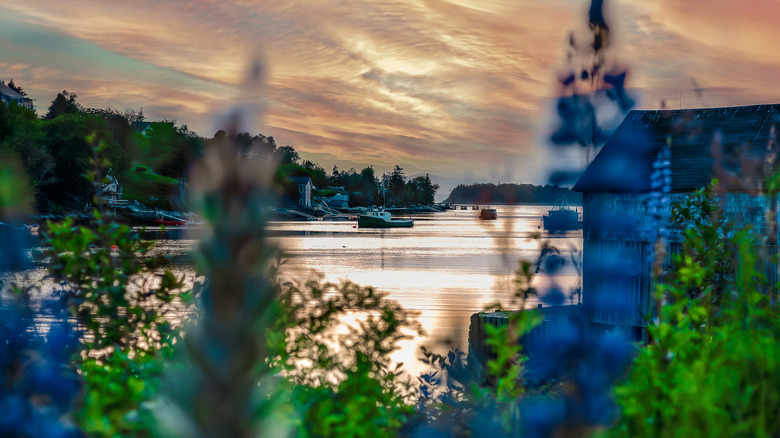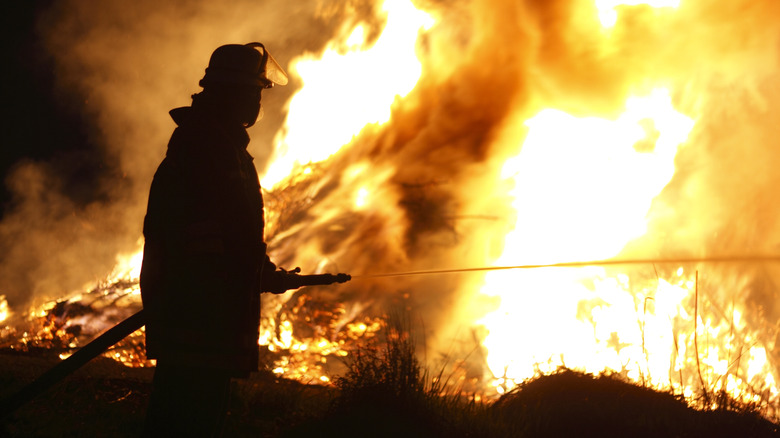What Tourists Should Know About Canada's Controversial Hiking Ban Before Visiting
Canada's eastern province of Nova Scotia is an outdoor lover's paradise, with its wide forested expanses and its atmospheric coastline dotted with fishing towns and their fascinating stories. However, a controversial ban on hiking meant to reduce the risk of wildfires may put a damper on your adventure if you are planning on sharing a campsite or hiking in the area.
Canada's Department of Natural Resources has closed access to all forests, hiking trails, and backcountry routes in the province. Because of the current drought conditions, the risk of wildfires is great, so the department issued a proclamation to "prohibit entry into the woods for the purposes of traveling, camping, fishing, or picnicking, or any other purpose, without a valid travel permit in all counties in Nova Scotia." The ban is effective August 5 through October 15, 2025, or until conditions improve. Violation of the order is punishable with an $18,000 (U.S.) fine.
As of July 2025, the province was already under a burn ban prohibiting open fires, also subject to the whopping $18,000 fine. Due to an alarming increase in incidents, the ban was tightened to now include any kind of entry. Natural Resources Minister Tory Rushton said in a statement on August 5, that there had already been more than 100 wildfires registered in the 2025 season, and that while they had all been successfully extinguished, the dry conditions could worsen these odds.
What you can and cannot do under Canada's new hiking ban
According to a Facebook post by the community association Nova Scotia Fire/Emergency/Info, "Brief entry to the woods is okay — for example: short trails providing access from parking areas to locations such as beaches (etc). However, other access and activities within woodland areas are discouraged."
In the August 5 statement, the government said that trails are off-limits, and camping is allowed only in official campgrounds. The statement quoted Premier Tim Houston, who explained that "Most wildfires are caused by human activity, so to reduce the risk, we're keeping people out of the woods until conditions improve," for example, when there's enough rain to ease the dry conditions. Nova Scotia is among the most scenic places in Canada to visit, offering myriad attractions despite the ban, such as beach-going, sea-kayaking, fishing in open areas, and exploring non-wooded municipal parks that remain open.
The province of Newfoundland and Labrador, also plagued with wildfires, already had fire bans in place, with even heavier fines, ranging from $36,000 to $108,600 (U.S.), plus a potential prison sentence. For similar reasons, Crown land is off-limits in the province of New Brunswick, although with no accompanying fines.
Canada's forest ban is not without controversy
Tourism businesses have had to think on their feet, and fast, after the ban was announced in the middle of peak season. CBC gave an example of an adventure company that had to cancel a four-day hiking booking. A company representative had to redirect customers to camping and other activities focused on the river, as those are still open.
In related news, CBC also reported that a Nova Scotia resident tested the enforcement of the ban intentionally in order to challenge it in court, arguing that the restriction was arbitrary as walking in itself cannot cause a fire. Sure enough, he was promptly handed a fine and a surcharge totaling around $20,900 (U.S.).
The ban sparked an animated debate on Reddit. "Restrictions to entering the woods because of fire risk is not new," user Chester_Beardie commented, attaching a copy of an article said to be from 50 years ago that announced a similar measure. "It is [meant] to keep us safe." Another Redditor Infamous-Echo-2961 wrote that, while they understand the need to limit the risk of people acting irresponsibly, the ban on hiking "seems extreme." However, u/Content-Inspector993 replied, "[Nova Scotia] is a small province so a fire can spread and do a lot of damage to a large percentage of our population very quickly, so it is better to suck it up and find alternative forms of entertainment for a few weeks."
Travelers can prepare for visiting as they would any other hiking location under similar risks, by reading up on safety tips for vacationing in wildfire country. During the particular conditions that put these areas at high risk of wildfires, visitors should also check local restrictions frequently, respect travel bans, and keep in mind the high cost of fines for violations.


